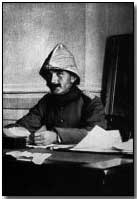Primary Documents - Proclamation of the Young Turks, 1908
 Reproduced below is the
proclamation issued by the Young Turks in 1908 with their coming to power in
Turkey.
Reproduced below is the
proclamation issued by the Young Turks in 1908 with their coming to power in
Turkey.
With the coming of war in Europe in August 1914 the Young Turk administration proved far more receptive to German friendship than to approaches from the Allies, and eventually ended a stance of neutrality at the end of August 1914 by declaring an alliance with Germany (secretly agreed as early as 2 August 1914).
Proclamation for the Ottoman Empire
1. The basis for the Constitution will be respect for the predominance of the national will. One of the consequences of this principle will be to require without delay the responsibility of the minister before the Chamber, and, consequently, to consider the minister as having resigned, when he does not have a majority of the votes of the Chamber.
2. Provided that the number of senators does not exceed one-third the number of deputies, the Senate will be named as follows: one-third by the Sultan and two-thirds by the nation, and the term of senators will be of limited duration.
3. It will be demanded that all Ottoman subjects having completed their twentieth year, regardless of whether they possess property or fortune, shall have the right to vote. Those who have lost their civil rights will naturally be deprived of this right.
4. It will be demanded that the right freely to constitute political groups be inserted in a precise fashion in the constitutional charter, in order that article 1 of the Constitution of 1293 A.H. [=Anno Hegira] be respected.
7. The Turkish tongue will remain the official state language. Official correspondence and discussion will take place in Turkish.
9. Every citizen will enjoy complete liberty and equality, regardless of nationality or religion, and be submitted to the same obligations. All Ottomans, being equal before the law as regards rights and duties relative to the State, are eligible for government posts, according to their individual capacity and their education. Non-Muslims will be equally liable to the military law.
10. The free exercise of the religious privileges which have been accorded to different nationalities will remain intact.
11. The reorganization and distribution of the State forces, on land as well as on sea, will be undertaken in accordance with the political and geographical situation of the country, taking into account the integrity of the other European powers.
14. Provided that the property rights of landholders are not infringed upon (for such rights must be respected and must remain intact, according to law), it will be proposed that peasants be permitted to acquire land, and they will be accorded means to borrow money at a moderate rate.
16. Education will be free. Every Ottoman citizen, within the limits of the prescriptions of the Constitution, may operate a private school in accordance with the special laws.
17. All schools will operate under the surveillance of the state. In order to obtain for Ottoman citizens an education of a homogenous and uniform character, the officials schools will be open, their instruction will be free, and all nationalities will be admitted. Instruction in Turkish will be obligatory in public schools. In official schools, public instruction will be free. Secondary and higher education will be given in the public and official schools indicated above; it will use the Turkish tongue. Schools of commerce, agriculture, and industry will be opened with the goal of developing the resources of the country.
18. Steps shall also be taken for the formation of roads and railways and canals to increase the facilities of communication and increase the sources of the wealth of the country. Everything that can impede commerce or agriculture shall be abolished.
Source: The Young Turks, trans. A. Sarrou, in Civilization since Waterloo, Rondo Cameron, ed. (Paris, 1912), pp. 40-42. Text modernised by Prof. Arkenberg.
An 'Old Sweat' was slang to denote an experienced soldier.
- Did you know?
